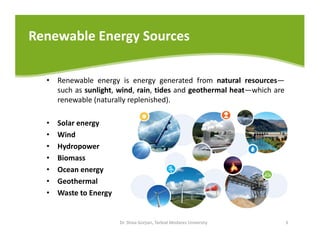
Unveiling the Innovation: Renewable Energy Technology
In the pursuit of a sustainable future, renewable energy technology stands as a beacon of innovation, transforming the way we harness power. This article delves into the diverse landscape of renewable energy technologies, exploring their impact, advancements, and the crucial role they play in shaping a cleaner and greener world.
Solar Power: Capturing the Radiance of the Sun
At the forefront of renewable energy technology is solar power, which captures the radiant energy of the sun and converts it into electricity. Solar panels, equipped with photovoltaic cells, are the building blocks of this technology. Advancements in solar panel efficiency and design have made harnessing the sun’s energy more accessible and cost-effective, contributing to the widespread adoption of solar power solutions.
Wind Energy: Harnessing Nature’s Breath
Wind energy technology leverages the kinetic energy of moving air to generate electricity through wind turbines. Positioned strategically in areas with consistent wind patterns, these turbines have become iconic symbols of clean energy. Ongoing research and engineering innovations continue to enhance the efficiency and scalability of wind energy, making it a significant player in the renewable energy landscape.
Hydropower: Tapping into Flowing Potential
Hydropower, a well-established form of renewable energy, harnesses the energy of flowing water to generate electricity. Dams and turbines convert the kinetic energy of rivers and waterfalls into a reliable power source. While the environmental impact of large-scale hydropower projects is a consideration, innovations in technology aim to minimize these effects and maximize the sustainability of hydropower.
Geothermal Energy: Unleashing Earth’s Heat
Geothermal energy taps into the Earth’s internal heat, utilizing steam or hot water to generate electricity. This form of renewable energy technology is particularly effective in regions with geothermal activity. Geothermal power plants play a vital role in providing a continuous and sustainable energy source, with minimal greenhouse gas emissions compared to traditional fossil fuels.
Biomass: Transforming Organic Materials
Biomass technology involves converting organic materials, such as agricultural residues and wood, into energy through processes like combustion or biofuel production. This versatile renewable energy source contributes to reducing waste and provides an alternative to conventional fossil fuels. Advancements in biomass technology focus on optimizing energy production while minimizing environmental impact.
Nuclear Energy: A Controversial Option
While the debate around nuclear energy’s safety and waste disposal continues, it remains a part of the renewable energy discourse. Nuclear power plants harness controlled nuclear reactions to generate electricity without direct carbon emissions. Research and development in nuclear technology aim to address safety concerns and improve the efficiency of nuclear energy as a cleaner alternative.
Energy Storage Solutions: Balancing the Flux
One of the challenges in renewable energy technology lies in the intermittent nature of sources like solar and wind. Energy storage solutions, such as advanced batteries, play a pivotal role in storing excess energy during peak production for later use. Continuous innovation in energy storage enhances the reliability and stability of renewable energy systems.
Smart Grids: Revolutionizing Energy Distribution
The integration of smart grids represents a leap forward in renewable energy technology. Smart grids enable real-time monitoring, control, and optimization of energy distribution. This technology facilitates efficient energy use, reduces wastage, and supports the seamless integration of renewable energy into existing power infrastructures.
Electrification of Transportation: A Greener Road Ahead
Renewable energy technology extends its influence to transportation through the electrification of vehicles. Electric vehicles (EVs), powered by renewable sources, offer a sustainable alternative to traditional combustion engines. As EV technology advances, it aligns with the broader goal of reducing the environmental impact of transportation.
A Sustainable Tomorrow: Renewable Energy Technology
In conclusion, renewable energy technology stands as a catalyst for a sustainable and cleaner tomorrow. From solar and wind power to hydropower, geothermal energy, and beyond, these technologies collectively shape the future of power generation. To explore more about the transformative potential of renewable energy technology, visit Renewable energy technology and embrace a future powered by innovation and sustainability.

